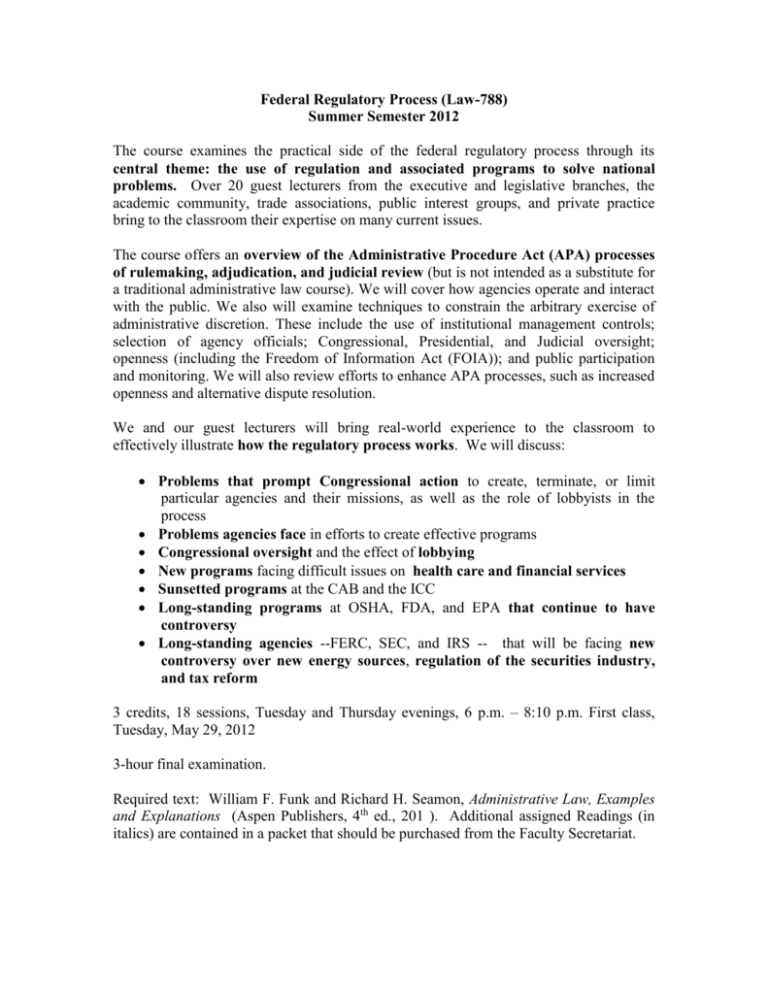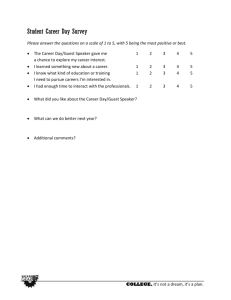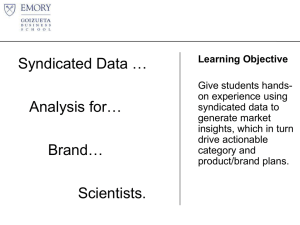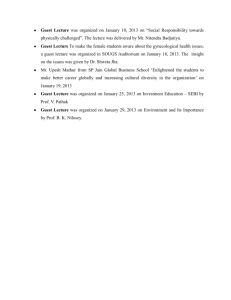
Federal Regulatory Process (Law-788)
Summer Semester 2012
The course examines the practical side of the federal regulatory process through its
central theme: the use of regulation and associated programs to solve national
problems. Over 20 guest lecturers from the executive and legislative branches, the
academic community, trade associations, public interest groups, and private practice
bring to the classroom their expertise on many current issues.
The course offers an overview of the Administrative Procedure Act (APA) processes
of rulemaking, adjudication, and judicial review (but is not intended as a substitute for
a traditional administrative law course). We will cover how agencies operate and interact
with the public. We also will examine techniques to constrain the arbitrary exercise of
administrative discretion. These include the use of institutional management controls;
selection of agency officials; Congressional, Presidential, and Judicial oversight;
openness (including the Freedom of Information Act (FOIA)); and public participation
and monitoring. We will also review efforts to enhance APA processes, such as increased
openness and alternative dispute resolution.
We and our guest lecturers will bring real-world experience to the classroom to
effectively illustrate how the regulatory process works. We will discuss:
Problems that prompt Congressional action to create, terminate, or limit
particular agencies and their missions, as well as the role of lobbyists in the
process
Problems agencies face in efforts to create effective programs
Congressional oversight and the effect of lobbying
New programs facing difficult issues on health care and financial services
Sunsetted programs at the CAB and the ICC
Long-standing programs at OSHA, FDA, and EPA that continue to have
controversy
Long-standing agencies --FERC, SEC, and IRS -- that will be facing new
controversy over new energy sources, regulation of the securities industry,
and tax reform
3 credits, 18 sessions, Tuesday and Thursday evenings, 6 p.m. – 8:10 p.m. First class,
Tuesday, May 29, 2012
3-hour final examination.
Required text: William F. Funk and Richard H. Seamon, Administrative Law, Examples
and Explanations (Aspen Publishers, 4th ed., 201 ). Additional assigned Readings (in
italics) are contained in a packet that should be purchased from the Faculty Secretariat.
Professors Gary J. Edles, Jerome Nelson, and Neil R. Eisner coordinate the seminar.
They work collaboratively to create the course, choose speakers, and draft and mark the
final exam.
Professor Edles worked as a lawyer at 4 federal agencies over a 28-year career. He was
General Counsel of the Administrative Conference of the United States, Director of the
Office of Proceedings at the Interstate Commerce Commission, Deputy General Counsel
at the Civil Aeronautics Board, and an appellate administrative judge at the Nuclear
Regulatory Commission. He now lives in England, where he teaches at the University of
Hull Law School, and is listed in Who’s Who in America and Who’s Who in American
Law.
Professor Nelson spent more than 30 years as a government lawyer, including serving as
General Counsel of the Nuclear Regulatory Commission, Solicitor of the Federal Energy
Regulatory Commission (FERC), and an Administrative Law Judge at the FERC. He
was also a partner in a Washington law firm specializing in litigation and a Hearing
Officer with NASD (now FINRA), a self-regulatory organization in the securities
industry. He also teaches at the University of Maryland School of Law.
Edles and Nelson are co-authors of Federal Regulatory Process: Agency Practices and
Procedures (Aspen Prentice-Hall, 2d ed. 1989) (supplemented 1997), a book that has
been cited in a Supreme Court opinion and several lower court opinions. They also
taught administrative law on the faculty of the Department of Justice Legal Education
Institute.
Professor Eisner is Assistant General Counsel for Regulation and Enforcement at the
Department of Transportation and former Assistant Chief Counsel for Regulation at the
Federal Aviation Administration.
He served as chairman of the Section of
Administrative Law and Regulatory Practice of the American Bar Association and a
government member and chair of the Committee on Governmental Processes of the
Administrative Conference of the United States, where he is now a Senior Fellow. He
has testified before committees of Congress, lectured at several law schools, and is the
author of several articles on the regulatory process.
2
Tuesday, May 29: An Introduction to the Federal Regulatory Process:
Federal Agencies as Institutions
Requirements of Due Process
Basic Concepts Underlying the Administrative Procedure Act
Reading
Course Objectives and Organization
Funk & Seamon, pp. 2-13, 23-28, 41-56 (exclude Examples & Explanations
pp. 56-59), 59-64, 107-118 (exclude b. Liberty and Correctional Facilities), 120-138,
144-146 (C. Rules v. Orders)
Edles & Nelson, Federal Regulatory Process, Chapter 2, Federal Agencies as
Institutions
Speaker
Professor Nelson
Thursday, May 31: An Introduction to Administrative Procedure: Formal
Adjudication
Reading
Funk & Seamon, pp. 71-102 (Exclude Alternative Dispute Resolution and
Administrative Law, following), 103-105
Attorney General’s Manual on the Administrative Procedure Act (U.S. Dep’t of Justice
1947) (Fundamental Concepts)
Speaker
Professor Nelson
Guest Speaker
Administrative Law Judge Judith A. Dowd, Federal Energy Regulatory
Commission
3
Tuesday, June 5: An Introduction to Administrative Procedure: The Rulemaking
Process
Reading
Funk & Seamon, pp. 64-68 (3. supervision), 139-175, 179-187 (exclude Section III F,
Negotiated Rulemaking, following), 188-206
Memorandum of President Obama on Regulatory Review, January 30, 2009
Speaker
Professor Eisner
Guest Speaker
Robert Shull, Program Officer, Workers’ Rights Public Welfare Foundation
Formerly, Deputy Director for Auto Safety and Regulatory Policy, Public Citizen
Thursday, June 7: Openness in Government: Freedom of Information Act and
Related Statutes
Reading
Funk & Seamon, pp. 355-398
Daniel Metcalfe, Sunshine Not So Bright: FOIA Implementation Lags Behind,
Administrative and Regulatory Law News 5 (Summer 2009)
Memorandum of President Obama for Heads of Executive Departments and Agencies
on the Freedom of Information Act (Jan. 21, 2009)
Memorandum of Attorney General Eric Holder for Heads of Executive Departments
and Agencies on the Freedom of Information Act (March 19, 2009)
Guest Speakers
Professor Daniel J. Metcalfe, Executive Director, Collaboration on Government
Secrecy, Washington College of Law, founding director, Office of Information and
Privacy, U.S. Department of Justice
Julie A. Murray, Esq., Staff Attorney, Public Citizen Litigation Group
4
Tuesday, June 12: Judicial Review of Agency Action
Reading
Funk & Seamon, pp. 207-211 (exclude B Jurisdiction-Standing, following), 239-312
(exclude IV De Novo Review), 314-320 (Exclude Sections VII, VIII, following)
Patricia A. Millett, “We’re the Government and We’re Here to Help”: Obtaining
Amicus Support From the Federal Government in Supreme Court Cases, 10 Journal
of Appellate Practice and Process 209 (2009)
Mark B. Stern & Alisa B. Klein, The Government’s Litigator: Taking Clients
Seriously, 54 Admin. L. Rev. 1409 (2000) *
Speaker
Professor Nelson
Guest Speakers
James Horwood, Esq., partner, Spiegel & McDiarmid
Christine Kohl, Esq., Staff Attorney, Appellate Section, Civil Division, Department
of Justice
Thursday, June 14: Energy Regulation: The Federal Energy Regulatory
Commission
Reading
Introduction to FERC
Guest Speakers
Robert H. Solomon, Solicitor, Federal Energy Regulatory Commission
George H. (Greg) Williams, Esq., Bracewell & Giuliani, Washington, DC, formerly
trial and appellate attorney, Federal Energy Regulatory Commission
* The American Bar Association grants permission to reprint, in whole or part,
materials from the Administrative Law Review for classroom use.
We
acknowledge the original publication of all materials from the Administrative Law
Review. Such materials are “Reprinted by permission of the American Bar
Association. All rights reserved.”
5
Tuesday, June 19: Who Does What and Why? Delegation of Statutory Authority;
Reasons for Regulation; Presidential Appointments and Agency Operations
Reading
Funk & Seamon, pp. 28-41
Reasons for Regulation (February 2006)
Whitman, Administrator, EPA v. American Trucking Associations, et al., 531 U.S. 457
(2001) (excerpts)
Memorandum from Chairman Alfred Kahn to Bureau and Office Heads, Civil
Aeronautics Board (1977)
Speaker
Professor Edles
Guest Speakers
Hon. Thomasina V. Rogers, Chair, Occupational Safety and Health Review
Commission; formerly Deputy Director, White House Office of Personnel, Legal
Counsel, Equal Employment Opportunity Commission
Richard Huberman, Legal Assistant to Commissioner Rogers, Occupational Safety
and Health Review Commission
6
Thursday, June 21: Economic Regulation: SEC Oversight of the Securities Industry
– Disclosure, Enforcement and Self-Regulation
Reading
U.S. Securities and Exchange Commission: The Investor’s Advocate: How the SEC
Protects Investors, Maintains Market Integrity, and Facilitates Capital Formation
(Oct. 24, 2011)
About FINRA
FINRA News Release, SEC Approves FINRA Proposal to Give Investors Permanent
Option of All Public Arbitration Panel (Feb. 1, 2011)
Guest Speakers
Stephen J. Crimmins, Esq., K&L Gates, Washington, DC, formerly Deputy Chief
Litigation Counsel, Securities and Exchange Commission
Gary Goldsholle, Vice President and Associate General Counsel, Financial Industry
Regulatory Authority (FINRA)
Professor Egon Guttman, Washington College of Law
Tuesday, June 26: Health and Safety Regulation: The Food and Drug
Administration
Reading
John P. Swan, History of the FDA
Milton and Rose Friedman, Free to Choose, A Personal Statement (Harcourt Brace
Jovanovich 1990) (excerpt)
Guest Speaker
Leslie Kux, Esq., Acting Assistant Commissioner for Policy, Office of Policy,
Planning and Budget, U.S. Food and Drug Administration
7
Thursday, June 28: Health and Safety Regulation: The Role of OSHA and OSHRC
Reading
Sapper, The Occupational Safety and Health Act: How It Is Supposed to Work; How It
Does Work (June 2009)
Administrative Conference Recommendation 86-4: The Split-Enforcement Model for
Agency Adjudication
Guest Speakers
Robert Burt, Director, Office of Regulatory Analysis, Occupational Safety & Health
Administration, U.S. Department of Labor
Arthur Sapper, Esq., McDermott, Will & Emory, formerly Deputy General
Counsel, Occupational Safety and Health Review Commission
Tuesday, July 3: The Life Cycle of Government Regulation – The Rise and Fall of
the ICC and the CAB
Reading
Breger & Edles, Established By Practice: The Theory and Operation of Independent
Federal Agencies, 52 Admin. L. Rev. 1111 (2000) (excerpts)
Roy Pulsifer, Introduction, Symposium Issue on Federal Economic Regulation of the
Airlines, 41 J. Air Law & Comm. 573 (1975)
Edles, The Strategy of Regulatory Change, 49 ICC Practitioners' J. 626 (1982)
Speaker
Professor Edles
Guest Speakers
Craig Keats, Deputy General Counsel, Surface Transportation Board
Sanford Rederer, President, Aviation Planning and Finance, formerly Vice
President, Strategic Planning, Trans World Airways and Director, Office of
International Affairs, Civil Aeronautics Board
8
Thursday, July 5: Environmental Regulatiuon
Reading
Gerald H. Yamada and Alan B. Horowitz, Environmental Protection Agency, from
Edles & Nelson, Federal Regulatory Process (1997 Supp)
Special Message to Congress from President Nixon about Reorganization Plan No. 3
of 1970 to establish the Environmental Protection Agency (Reorganization Plan itself
not included)
National Environmental Policy Act of 1970 (introduction)
Guest Speaker
Gerald Yamada, Esq., Principal, Going Forward Strategies, formerly, partner
O’Connor & Hannan LLP, Principal Deputy General Counsel and Acting General
Counsel, Environmental Protection Agency
Tuesday, July 10: Regulatory Reform for the Financial Services Industry
Reading
Kathryn Reed Edge, Bank on It: The Dual Banking System Is Alive and Well, 47 Tenn.
B. J. 29 (2011)
Walter W. Eubanks, Federal Financial Services Regulatory Consolidation Structural
Responses to the 2007-2009 Financial Crisis (Congressional Research Service,
April 12, 2010) (excerpt)
Guest Speaker
Kevin L. Petrasic, Esq., Paul Hastings, formerly Assistant Chief Counsel, Office of
Thrift Supervision and Counsel, House Banking Committee
9
Thursday, July 12: Reform of Health Care
Reading
[Current Material To Be Distributed]
Guest Speaker
Professor Lindsay F. Wiley, Faculty Director, Health Law & Justice Program,
Washington College of Law
Tuesday, July 17: Taxation as Regulation
Reading
Urban Institute, Social Policy and the Tax System (2002)
Joseph J. Thorndike, Reorganization of the Internal Revenue Service: Reforming the
Internal Revenue Service: A Comparative History, 53 Admin. L. Rev. 717 (2001)
Guest Speaker
Professor Andrew Pike, Washington College of Law, formerly Associate Tax
Legislative Counsel, Office of Tax Policy, U.S. Department of the Treasury
Thursday, July 19: Congressional Oversight
Reading
Frederick N. Kaiser, Congressional Oversight, Congressional Research Service Report
to Congress, Order Code 97-936 GOV (Jan. 3, 2006).
Speakers
Mark D. Agrast, Deputy Assistant Attorney General, Office of Legislative Affairs
Elise J. Bean, Staff Director and Chief Counsel, Permanent Subcommittee on
Investigations, Senate Homeland Security and Government Affairs Committee
Thomas M. Susman, Director, Government Affairs Office, American Bar
Association, formerly, partner, Ropes & Gray, Washington, DC
10
Tuesday July 24: Alternatives to Traditional Regulation: Decisionmaking by
Consensus – Alternative Dispute Resolution
Reading
Funk & Seamon, pp. 102-103 (Alternative Dispute Resolution), 187-188 (Negotiated
Rulemaking)
Pou and Hwang, What Every Lawyer Should Know About Government ADR, The
Public Lawyer (Summer 1997)
Owen M. Fiss, Against Settlement, 93 Yale L. J. 1073 (1984) (excerpts)
Administrative Dispute Resolution Act, from Federal Administrative Procedure
Sourcebook (Funk, Lubbers, Pou, ed)
Speaker
Professor Nelson
Guest Speaker
Judith Kaleta, Assistant General Counsel for General Law, Department of
Transportation
Thursday, July 26: Final Thoughts and Exam Review
Speaker
Professor Eisner
11





